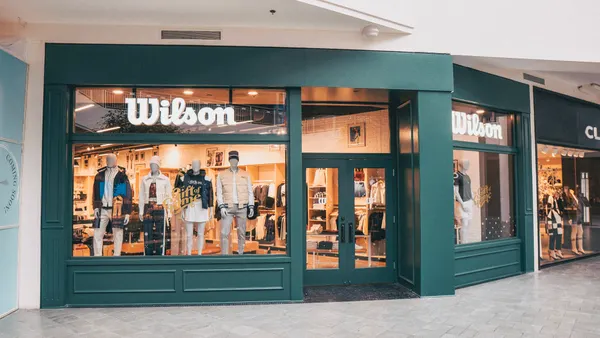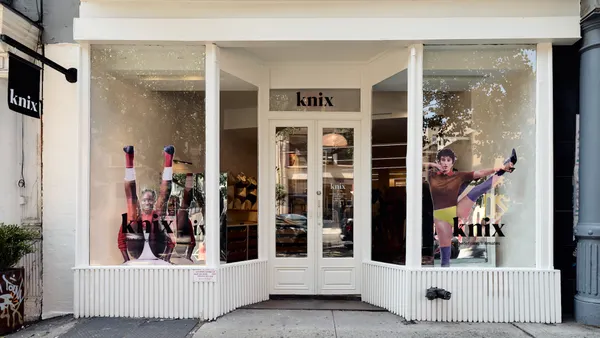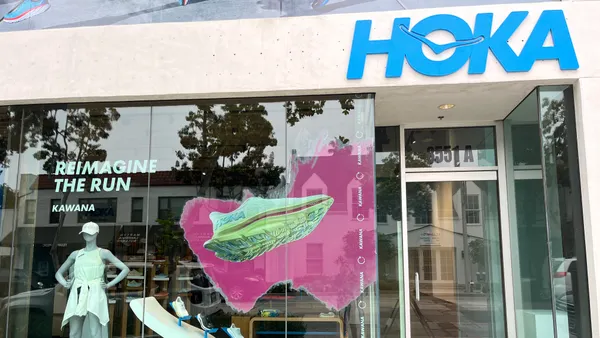Dive Brief:
-
As the pandemic's challenges continue, retailers will see modest sales growth of less than 2% year over year this holiday season, compared to 4.1% growth on average over the last decade, according to commercial real estate firm CBRE.
-
E-commerce will help a lot, with expected growth in November and December of more than 40%, well above the 14% record growth last year, while brick-and-mortar sales will decline, bringing online retail's share of sales in that period to 39%, according to a report sent by email.
-
To boost sales, retailers — attempting to nudge shopping earlier than usual — are beefing up operations to include more buy online, pick up in-store services and curbside pickup, (already up 500% during the pandemic), and employing alternatives like pop-ups, per the report.
Dive Insight:
The pandemic has roiled retail since early in the year, and, with its toll in the U.S. continuing, threatens to derail the holiday shopping season.
"Retail hasn't grappled with anything like the challenges it faces this year, and the holiday retail season will be affected as retailers adjust to changing shopping behaviors," CBRE Retail Leader John Morris said in a statement. "We will see modest growth this holiday season, as brick-and-mortar sales will be challenged and overall consumer confidence is tepid."
But e-commerce is expected to "hit new highs" this year, he also said. And retailers are prepared for that. CBRE's global head of retail research Meghann Martindale called this season "a significant test for new omnichannel strategies and practices."
"Retailers are becoming more creative in how they manage their physical locations and will continue to develop ways to support their growing e-commerce business," she said in a statement.
Brick-and-mortar stores provide much of the spirit of the season, and retailers are ensuring that their stores will be safe to shop, noted CBRE researchers, who expect them to "modify Black Friday promotions and hours of operation to avoid early-morning lines and overcrowding amid ongoing social-distancing measures and reduced store capacities."
Several executives in recent weeks, including the chief executives at Macy's and Nordstrom, have told analysts that they are working to get people shopping earlier than usual.
"We've had this long-held tradition that we don't decorate our stores until after Thanksgiving, and it may be the thing that we get more positive comments about from customers than anything else we do, but that doesn't mean that we shouldn't be in a position of selling customers what they want when they want it, and I think it's pretty clear that there's an opportunity for us to sell gifts prior to Thanksgiving," Nordstrom Chief Brand Officer Pete Nordstrom said in an August conference call, according to a Motley Fool transcript. "And so when we talk about an extension of what we've learned already from our gift-giving strategy last year, that was one of the key takeaways. So we're going to be bringing in gift offerings before Thanksgiving and having it clear to customers that we have that."
Retailers are downplaying Thanksgiving and Black Friday in part to encourage earlier shopping, and CBRE researchers note that several retailers have reversed course and will shut down on Thanksgiving Day. And e-commerce will carry the day this year, helped along by Amazon's Prime Day sales event this week as many rivals continue their tradition of matching the sale's prices, according to CBRE. Several retailers, including Walmart, Target and Best Buy, have already announced their own promotions during the same days as Amazon's.
What won't help sales through any channel or on any days is the pandemic's hit to the economy. CBRE forecasts a 9.1% unemployment rate in the fourth quarter, and, with employment improvements "uneven among income levels," researchers expect many consumers to give gifts to a smaller group of friends and family. The stimulus package that buoyed spending in the second quarter remains in limbo at press time, leaving many consumers vulnerable at the holidays. That sets up retailers for a repeat of the gloomy second quarter, which led to massive furloughs, new debt and worse.














